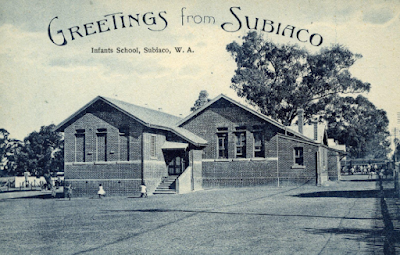Subiaco State School...(1918).
From 1914 to 1918 Australia was in the First World War. For those people who were left at home they experienced many hardships. This included losing loved ones, including brothers and fathers, friends and community members. Many soldiers who returned, disabled in the Great War were being cared for family members.
Individuals and families experienced financial hardships and food shortages. The role of Australian women were also changing as they volunteered for service in roles: as cooks, nurses, drivers, interpreters, munitions workers, and farm workers.
What was it like to be a parent or carer with children in state school schools during the Great War ? This letter provides a wonderful insight into the life of an ordinary working class mother with children in a state school and the patriotism that families were expected to participate in after four years of war.
The articles are from Trove, the database of the National Library of Australia. No copyright infringement intended.
Westralian Worker, 28 June 1918.
State School "Patriotism."
Some Serious Allegations.
Dear Worker,—
I have three children at school. One started at James-st. school this week, and was told that each child was expected in their spare time to make 20 garments for soldiers. In connection with the surprise days and "tuck" days, the mothers provide all the packets and foods and then, buy back again.
In the Subiaco school they held a surprise packet day recently. The 6th and 7th classes provided all the prizes and it was so successful they decided a few days afterwards to hold one right throughout the school, but the 6th and 7th classes were not exempt. The first time they made the call I gave everything I could. The second time I told my girl I couldn't give any more, and she cried and was dreadfully upset, saying the teacher wanted to get the most in the school, so I helped again for the child's sake and bought back again.
On the Friday the parents were invited to an auction at the school and the children came home at lunch time, asking for cakes, tea, sugar, etc., so that the teachers could give the parents afternoon tea. Now that was the third call made on the mothers in eight days for Red Cross appeal, besides the children making beads and other things at home at the same time. Why couldn't the teachers give the mothers a cup of tea without appealing through the children again? These teachers get bigger salaries than most of the fathers of the children, and yet every appeal is put on the little ones.
With reference to eggs. Last year the children were asked for eggs for the Soldiers' Institute and they collected 18,000 dozen. The secretary of the institute told me that they didn't know what to do with the eggs, and were using them up in every conceivable manner, as they couldn't get enough water glass to put them all down. Now, my children, like many others, had to go without eggs for some time to make up for that appeal, and they wouldn't go to school with out taking as many as possible. I believe the children collected £20,000 in two years, and they are asked to do the same in one year now.
It is time that all collections were stopped through the children, and the Government taxed all earnings for charitable purposes, then each would be giving according to their means. I wish I could write you all I feel in this matter, but I cannot. My husband earns 75/ per week, and I can tell you I have to work very hard in deed to pay my way honestly to keep up lodge and insurance fees and keep my children comfortably clad and fed for school, and pay off my instalments on the house.
I have collected and helped with all the charities in this district, but I know how the working-class women feel in this matter, and I hope the Minister for Education will see how dreadfully taxed the mothers of same of these children are.
Yours,
MOTHER
Subiaco.
Westralian Worker, 5 July 1918.
State School "Patriotism."
Last week we published an account of the methods employed at the Subiaco State School in connection with patriotic work. On Monday the article in question was read to the scholars by the headmaster. We understand that the statements contained in our article are admitted to be correct.
None the less consider able annoyance bas been expressed at the publicity given the matter. Why should not the public be told what the school system is? More particularly when the methods resorted to as "patriotic" amount to form of moral coercion absolutely destructive of the school purpose to say nothing of the taxation it imposes on parents who are already sufficiently burdened with the struggle for bread.
Numbers of children at Subiaco can not be supplied with the goods the school asks for. That mothers should be placed in the position of having to refuse their children the gifts more fortunate families are able to offer without difficulty, is a particularly vicious circumstance for any school "patriotism" to be responsible for.
The education system is a free system because the public conscience does not allow class distinctions and social differences to obtrude the blasting blight on the education of the young. And for school teachers to establish an arrangement of their own whereby certain children come to school with evidence of the comparative affluence of their homes while others come either with empty hands, or bring gifts which can be ill afforded, is to assail the fundamental condition of school equality. We ask the teachers to reconsider the whole question.
Western Mail, 28 November 1913.
AN INTERVAL IN THE DAY'S LESSONS CHILDREN LEAVING THE SUBIACO
STATE SCHOOL. BAGOT-ROAD. AT NOON.




